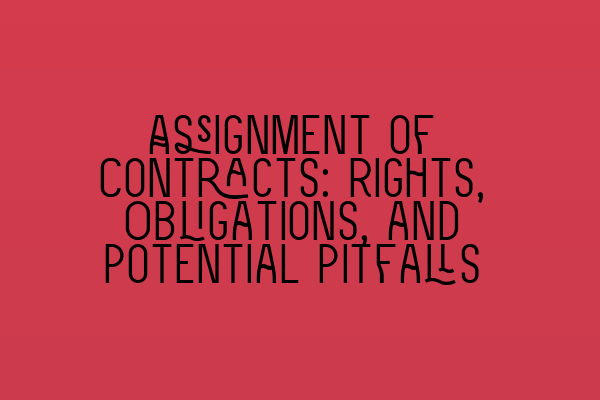Assignment of Contracts: Rights, Obligations, and Potential Pitfalls
Welcome to this comprehensive guide on the assignment of contracts! In the complex world of contract law, assignments play a crucial role in the transfer of rights and obligations from one party to another. With proper understanding and careful consideration, the assignment of contracts can prove to be a valuable tool for businesses and individuals alike.
In this article, we will delve into the intricacies of assignment agreements, explore the rights and obligations involved, and highlight potential pitfalls to watch out for. So, whether you are a solicitor, business professional, or someone interested in the legal aspects of contracts, this guide is for you.
Understanding Assignment Agreements
An assignment agreement is a legal contract that allows one party, known as the assignor, to transfer their rights and obligations under a contract to another party, referred to as the assignee. This transfer typically occurs when the assignor wishes to delegate their responsibilities or benefit from the contract to a third party.
The assignment agreement must clearly define the rights and obligations being transferred and specify any conditions or limitations surrounding the assignment. While the assignor may transfer their rights and obligations, they often remain liable if the assignee fails to fulfill their obligations. Therefore, it is essential to draft a comprehensive assignment agreement that protects the interests of all parties involved.
Rights and Obligations of the Parties
In an assignment of contract, both the assignor and assignee have distinct rights and obligations. Let’s take a closer look at each party’s role:
Assignor:
- The assignor retains the right to transfer their rights and obligations under the contract. This allows them to delegate tasks, responsibilities, or financial benefits to the assignee.
- The assignor may remain liable for the assigned obligations if the assignee fails to fulfill them. Therefore, it is crucial for the assignor to carefully select a reliable and competent assignee.
Assignee:
- The assignee gains the rights and obligations assigned by the assignor, allowing them to step into the assignor’s shoes and perform under the original contract.
- The assignee must fulfill the assigned obligations and adhere to the terms and conditions specified in the assignment agreement.
- The assignee may also benefit from any financial gains or advantages outlined in the original contract.
Potential Pitfalls and Considerations
While assignment agreements offer flexibility and convenience, they also come with potential pitfalls. It is crucial to be aware of these pitfalls and take necessary precautions. Here are a few key considerations:
- Consent and Notice: Before assigning a contract, it is essential to review the original contract and ensure that it allows for assignments. In some cases, the contract may have specific clauses that prohibit assignments without prior consent. Therefore, obtaining consent from all parties involved and providing appropriate notice is crucial.
- Liability: As mentioned earlier, the assignor may remain liable for the assigned obligations. To mitigate this risk, the assignment agreement should clearly outline the assignee’s responsibilities and include provisions that release the assignor from any liability once the assignment is complete.
- Confidentiality and Non-Disclosure: If the original contract includes confidential or sensitive information, it is vital to ensure that the assignee understands and agrees to maintain confidentiality. Any breach of confidentiality could lead to severe legal consequences.
- Performance and Competence: The assignee must possess the necessary skills, resources, and competence to fulfill the assigned obligations. Thoroughly vetting the assignee’s capabilities can help avoid potential conflicts or subpar performance.
By carefully navigating these potential pitfalls and considering the unique circumstances of each assignment, you can ensure a smooth and successful transfer of rights and obligations.
Conclusion
Assignments of contracts offer businesses and individuals a flexible means of transferring rights and obligations. However, navigating the intricacies of assignment agreements requires a thorough understanding of contract law and attention to detail. By identifying the rights and obligations of the parties involved and considering potential pitfalls, you can safeguard the interests of all parties and achieve a successful assignment.
If you’re interested in diving deeper into legal practice and decision-making, check out our related article on Unveiling Real-Life Case Studies: Insights into Legal Practice and Decision-Making. Looking to explore solicitor salaries and factors affecting income? Head over to Exploring Solicitor Salaries in the UK: Average Earnings and Factors Affecting Income. For solicitors seeking to enhance client relationship management skills, our article on Mastering Client Relationship Management: Skills for Solicitors to Enhance Trust and Loyalty is a must-read. And for those considering a law school education, we have an informative piece on Pursuing a Law School Education in the UK: Choosing the Right Path for Your Future. Finally, if you’re looking to secure training contracts on your path to becoming a solicitor, check out our detailed guide on Securing Training Contracts: A Roadmap to Becoming a Solicitor.
